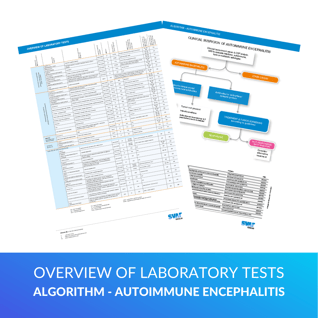- Other Products
- CCP
This year the Encephalitis Society awareness campaign is focused on the importance of mental health during and following encephalitis. Changes associated with encephalitis can take a toll on mental health, which must be considered when discussing encephalitis.
.png)
.png)
This year the Encephalitis Society awareness campaign is focused on the importance of mental health during and following encephalitis. Changes associated with encephalitis can take a toll on mental health, which must be considered when discussing encephalitis.
People are affected by encephalitis globally each year1
can be significantly reduced with early diagnosis and treatment1
include lack of specialists to interpret lab results and lack of availability of antibody tests1
The overlap of some encephalitis symptoms with other more common neurological or psychiatric manifestations can often make a diagnosis very challenging, which could risk a delay in correct diagnosis and prompt access to disease-modifying therapies.
Correctly diagnosing encephalitis is crucial since some treatments are effective when given early. That's why diagnosis is vital. Early diagnosis is essential to provide the patient with an early treatment to prevent disease progression. The longer the disease progresses, the more the likelihood of longer-term cognitive burden and mental health difficulties increases2.
Diagnosis requires a thorough history, physical exam, lab tests, brain imaging (MRI and CT scan), and EEG (measuring brain waves).
Specific tests are performed to identify the cause of encephalitis (infectious or autoimmune), such as microbiological tests to detect viruses or bacteria for infectious encephalitis and auto-antibody studies for AE.
Auto-antibody tests might include antibodies against; AMPA 1/2 receptors, CASPR2, DPPX, GABA B receptors, LGI-1, NMDA receptor, and VGKC.
Overview of Laboratory Tests & Algorithm - Autoimmune Encephalitis
Since it is difficult to know exactly what antibody that causes the symptoms of AE, Wieslab Diagnostic Services offer test panels for the suspicion of AE’s and Paraneoplastic Syndromes.
For selected indications, such as AE, where fast results are important for disease diagnosis and treatment decisions, we provide urgent testing service. Through our urgent testing the doctor can get the test result within 24h which is of importance if the symptoms are acute and the patients is hospitalized.
Benefit from our expertise, flexible solutions, and exceptional customer service - talk to us about your testing needs today!
Encephalitis Society (2022) Encephalitis: an in-depth review and gap analysis of key variables affecting global disease burden.
Abdat, Y. et al. Mental health outcomes of encephalitis: an international web-based study, http://medrxiv.org/content/early/2023/02/07/2023.02.03.23285344.abstract .
Erlangsen, A. et al. Association Between Neurological Disorders and Death by Suicide in Denmark. JAMA 323, 444–454 (2020).
Zhang, L. et al. Suicidality is a common and serious feature of anti-N-methyl-D-aspartate receptor encephalitis. J Neurol 264, 2378–2386 (2017).
Tellez-Martinez, A. et al. Suicidal thoughts and behaviors in anti-NMDAR encephalitis: psychopathological features and clinical outcomes. The Journal of Neuropsychiatry and Clinical Neuroscience.
Fusar-Poli, L., Gabbiadini, A., Battaglia, G., Signorelli, M. S. & Aguglia, E. The Management of Long-Term Psychiatric Sequelae in a Young Woman Who Suffered From Suspected Autoimmune Limbic Encephalitis. Clinical Medicine Insights: Psychiatry 11, 1179557320962520 (2020).
Ebaugh, F. G. Neuropsychiatric sequelae of acute epidemic encephalitis in children. 1923. J Atten Disord 11, 336–338; discussion 339-340 (2007).
WANT TO KNOW MORE?
For more information about encephalitis, patient stories, and how you can contribute to World Encephalitis Day, please go to: https://www.encephalitis.info.